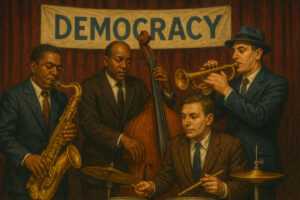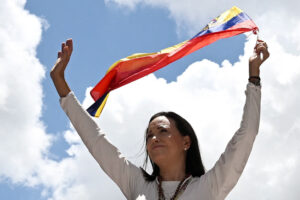
SNF Agora Fellow Scott Warren pondered a crucial question: Was the pro-democracy movement in America equipped to meet this pivotal moment in history? Warren works deeply on democracy issues, yet he felt something crucial was missing.
“After the election, I wrote a piece making the case that this was a moment to think differently about democracy in the US.” Rather than simply prescribing solutions, Warren felt the democracy community needed space for reflection. “I didn’t have all the answers,” he admits. “Part of what I was getting at was that it was a time to listen and not jump to conclusions.”
This commitment to listening became the genesis for “The Path Forward: Defining the Democracy Reform Movement,” a weekly interview series published by The Fulcrum. Each Thursday, Warren’s conversations with diverse democracy advocates appear online, creating a tapestry of perspectives on what’s working, what isn’t, and how the movement might evolve.
Warren has honed his listening over many years, intentionally seeking to hear from voices across the spectrum. “I’ve talked to faith leaders, structural reformists, election officials, futurists, folks from the conservative end of things, and people focused on local infrastructure,” he explains. This diversity reflects his belief that no single approach holds all the answers.
Through these conversations, some notable themes have emerged. One is coordination. Julia Roig, the Chief Network Weaver at the Horizons Project, described the pro-democracy movement as “a jazz band in which everyone plays different instruments, there’s not a song sheet, there’s no conductor, but everyone is generally moving in the same direction.” This metaphor captures the beauty and challenge of coordinating diverse efforts toward a common goal.
Another theme is timeline. There is a tension between acting with urgency and taking time for deliberation that appears repeatedly. In the interview with Andy Moore about electoral reforms, Warren reflected, “That balance between acting with urgency and acting intentionally over time is one that I continue to hear when I talk to people, and it’s not an easy one.”
Reverend F. Willis Johnson raised a theme of citizen disconnect that resonated deeply with Warren; the concern is about the movement becoming “too professionalized and out of touch with everyday people.” Johnson described how national organizations often receive disproportionate resources while local actors doing critical work remain underfunded. Warren acknowledges this critique: “His perspective, which I’ve heard from other interviewers too, is that these national organizations are taking up resources while local actors doing the work aren’t getting as many resources. I think that’s valid.”
Warren worries that democracy work can drift into becoming overly abstract or technical, losing connection with ordinary citizens’ concerns. “I worry that this space is too technocratic sometimes, which is paradoxical because good democracy work should be about listening and doing work for, of, by the people. The work can’t be too technocratic if you’re not actually listening to people on the ground.”
The project aligns well with the mission of the SNF Agora Institute, which aims to strengthen global democracy through powerful civic engagement and informed, inclusive dialogue. When asked about this connection, Warren explains: “A lot of what I spend time doing is traveling across the country, predominantly working with folks on the right, but with people who care about democracy and listening to the challenges they face.”
Through his Fulcrum interviews, Warren has discovered that many in the field share his sense that something needs to change. “People want to do things differently. And don’t quite know what that means yet. And I think that’s okay.”
This embrace of uncertainty feels appropriate for a movement at a crossroads. “This could be just on the cusp of thinking about things fundamentally differently—whether it’s the sector, whether it’s who’s in the sector, whether it’s how to approach the work,” Warren reflects.
As Warren’s interviews continue, with figures like Stephen Richer, the former Republican Maricopa County Recorder who challenged election denialism, he’s creating space for the fundamental rethinking democracy requires.
In an era when authentic political dialogue often feels scarce, Warren’s project represents something vital: a willingness to listen deeply before charging ahead with solutions. By bringing diverse voices together and allowing tensions and disagreements to surface honestly, he’s modeling the values the pro-democracy movement seeks to strengthen.
“There are no silver bullet solutions,” Warren reminds us. “And the more we realize that and the more that we’re curious about it, I think the further we can get.”
Warren’s project suggests that creating space for reflection, listening, and honest conversation will help the movement find its way. By bringing together voices from across the spectrum – from election officials and structural reformers to faith leaders and local organizers – he’s documenting challenges and building a community of practice. As democracy faces mounting pressures, Warren’s work points to the future that’s possible when diverse voices come together, learn together, and use that learning to act collectively.

